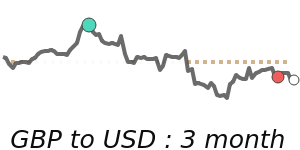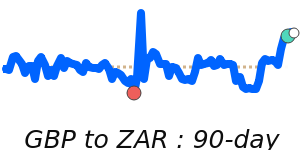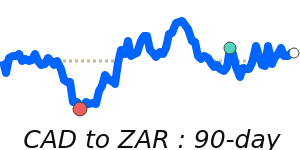![]()
![]() The GBP to ZAR exchange rate has recently been influenced by a mix of political and economic developments on both sides. Following the announcement of a 10% tariff on UK imports by U.S. President Trump, the pound has shown resilience, rallying even after the Bank of England (BoE) cut interest rates. Analysts note that this increase is tied to a tempered outlook on further rate cuts, with the market now expecting only two additional cuts in 2025, one less than previously anticipated. A speech by BoE Governor Andrew Bailey could further impact the GBP, particularly if he indicates a willingness to adjust rates in response to inflation dynamics.
The GBP to ZAR exchange rate has recently been influenced by a mix of political and economic developments on both sides. Following the announcement of a 10% tariff on UK imports by U.S. President Trump, the pound has shown resilience, rallying even after the Bank of England (BoE) cut interest rates. Analysts note that this increase is tied to a tempered outlook on further rate cuts, with the market now expecting only two additional cuts in 2025, one less than previously anticipated. A speech by BoE Governor Andrew Bailey could further impact the GBP, particularly if he indicates a willingness to adjust rates in response to inflation dynamics.
Currently, the GBP is trading at 24.12 ZAR, which is slightly above its three-month average of 23.99 ZAR. It has experienced notable volatility, fluctuating within a 10.7% range of 22.81 to 25.25 recently. Factors contributing to this volatility include shifts in market sentiment, as the GBP is sensitive to domestic economic indicators and political developments, especially post-Brexit.
On the South African side, the ZAR has also been affected by external factors. The U.S. tariff on South African goods stands at 30%, impacting the nation’s trade balance and foreign investment levels. Economists point out that South Africa’s reliance on international capital makes it vulnerable to global market conditions, a situation compounded by the current volatility in oil prices. With oil trading at 62.84 USD, it is approximately 9.8% below its three-month average, reflecting a potentially negative sentiment for the ZAR due to South Africa's exposure to oil price fluctuations.
Looking ahead, the performance of the GBP/ZAR pair will likely hinge on ongoing trade discussions, monetary policy adjustments from the BoE, and shifts in investor confidence in both the UK and South Africa's economic outlooks. As global market conditions evolve, particularly with respect to oil prices and trade agreements, the exchange rate is expected to remain volatile. Investors and businesses engaged in international transactions should remain vigilant to shifts in this dynamic currency pair.
Loading rates...
|
|
|
ZAR to GBP Market Data
South African rand (ZAR) to British pound (GBP) market data - latest interbank exchange rate, trend, chart & historic rates.
Compare & Save - South African rand to British pound
Exchange rates can vary significantly between different currency exchange providers, so it's important to compare South African rand (ZAR) to British pound (GBP) rates from different sources before making a conversion.
Use our ZAR to GBP calculator to see how much you could save on your international money transfers. makes it easy to compare the Total Cost you are being charged on Rand to Sterling currency rates and the possible savings of using various providers.
| Date | ZAR/GBP | Period |
|---|---|---|
19 Apr 2025 | 0.0401 | 2 Week |
02 Feb 2025 | 0.0428 | 3 Month |
03 May 2024 | 0.0431 | 1 Year |
04 May 2020 | 0.0435 | 5 Year |
06 May 2015 | 0.0546 | 10 Year |
08 May 2005 | 0.0877 | 20 Year |
Will the South African rand rise against the British pound?
It is almost impossible to predict what an exchange rate will do in the future, the best approach is to monitor the currency markets and transact when an exchange rate moves in your favour.
To help with this you can add ZAR/GBP to your personalised Rate Tracker to track and benefit from currency movements.
Rather than requiring you to set a target rate, our Rate Alerts keep you informed of recent trends and movements of currency pairs.
Add rates to your Rate Tracker and select to receive an daily email (mon-fri) or when a rate is trending
Related exchange rate forecasts
BER articles that mention the British pound (GBP):
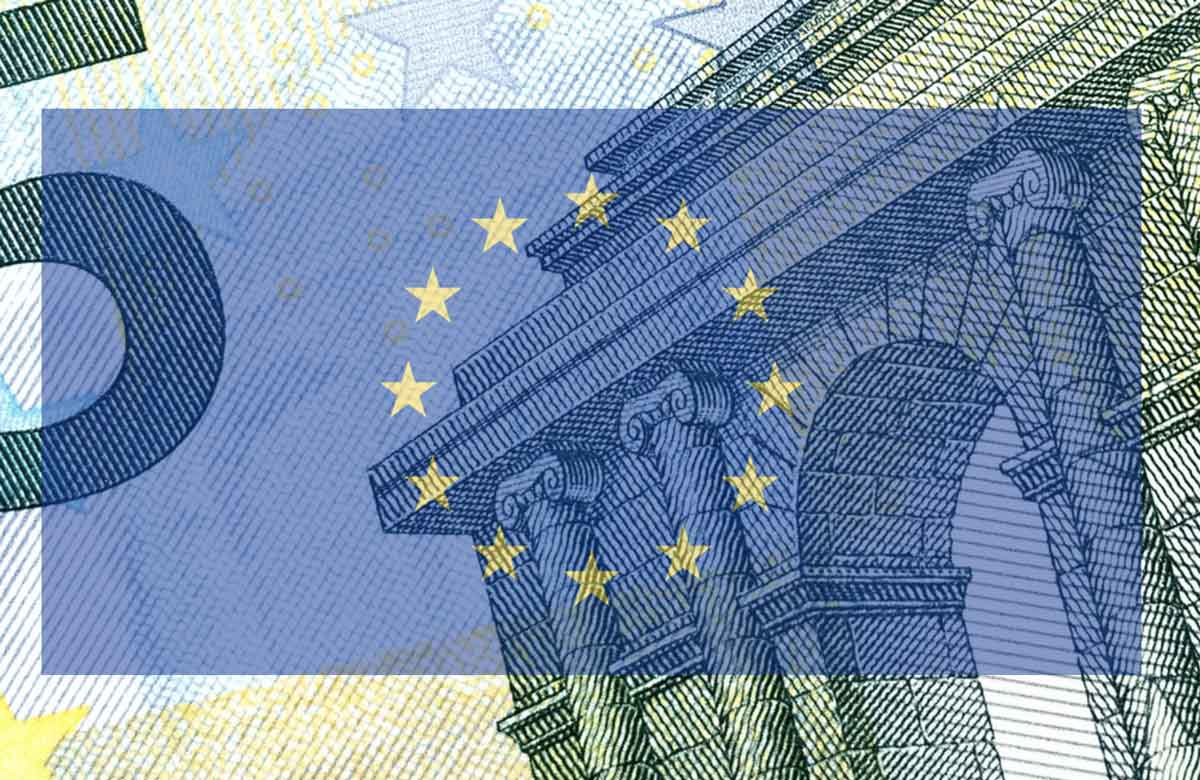
The U.S. Dollar Is Losing Ground to the Euro — And the World Is Watching
Deutsche Bank forecasts a significant weakening of the US dollar in the coming years, potentially reaching its lowest level against the euro in over a decade.
Wise Review: Is It the Best Way to Transfer Money Internationally?
The Wise Account allows users to hold and convert funds in 40 different currencies and send and spend internationally, all at the “real” exchange rate and with exceptionally low service fees. Users can also receive major-currency payments free of charge.
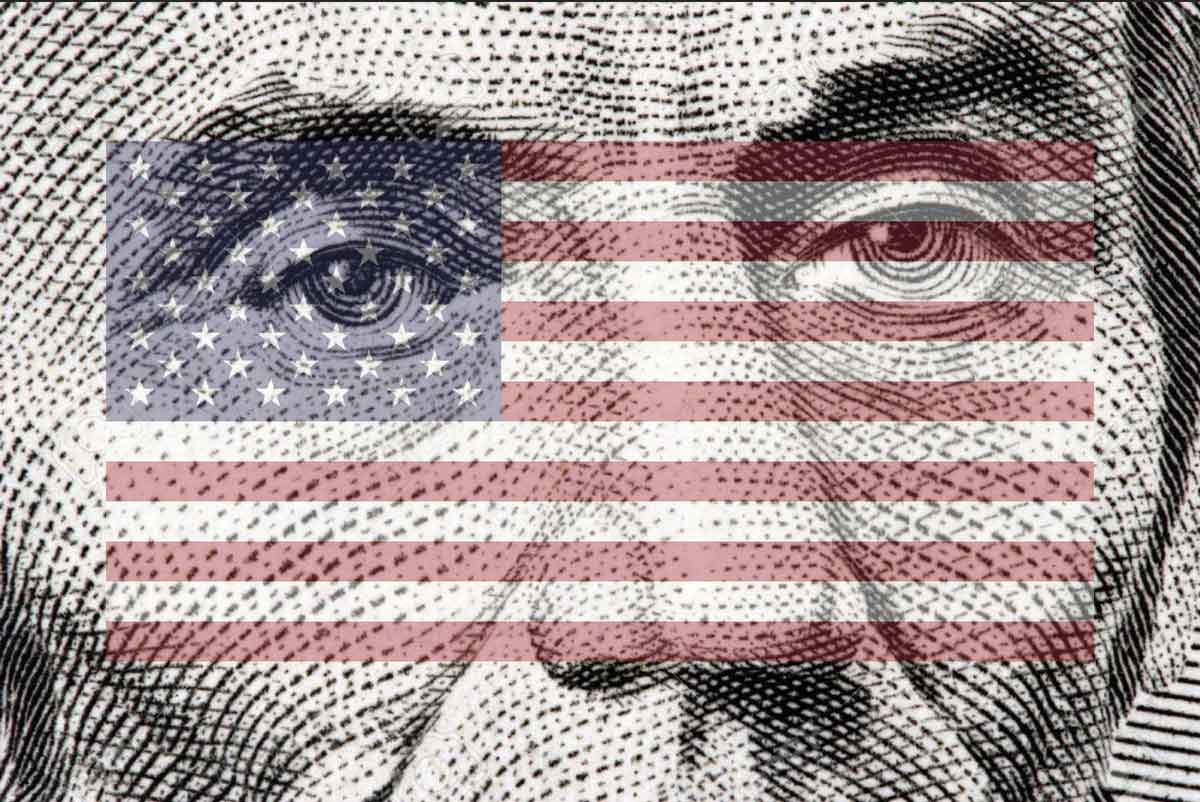
Global Currency Markets React to U.S. Tariffs and Economic Policies
Recent U.S. trade policies, including aggressive tariffs on auto imports, have introduced significant volatility in global currency markets, affecting major currencies such as the euro, British pound, and Japanese yen.
Further reading on the British pound (GBP) - Guides, Reviews & News from our research team.
Forecasts disclaimer: Please be advised that the forecasts and analysis of market data presented on BestExchangeRates.com are solely a review and compilation of forecasts from various market experts and economists. These forecasts are not meant to reflect the opinions or views of BestExchangeRates.com or its affiliates, nor should they be construed as a recommendation or advice to engage in any financial transactions. Read more
